Expungement can also be called expunction and it refers to the court-ordered process whereby a legal record associated with an arrest or a criminal conviction is, in essence, erased from the records. In actuality, the arrest or conviction is sealed or done away with in the eyes of the law. The availability of expungement and the regulations regarding expungement can vary significantly from state to state and even from county to county in which the conviction transpired.
The Legal Effect
Expungement normally means that your arrest or conviction has been sealed in the sense that it’s no longer on your criminal record for most purposes. After you’ve received your expungement, you should no longer be obligated to disclose that arrest or conviction. This can be especially important when you are filling out applications for jobs, apartments, colleges, and even credit.
Your expunged arrest or conviction will be as good as gone for such purposes, and if you become the subject of a public records inspection or a background search, the expunged incident should not be discoverable.
Are the Records Really Gone?
While expunged records are, in effect, gone, they are not actually erased in the true sense of the word. Your expungement will remain in your criminal record, which can be obtained by specific government agencies that include law enforcement and criminal courts. This is why expunged records are often referred to as being under seal. In certain limited legal proceedings, an expungement might be used as proof of a prior conviction. Expunged records, in essence, have truly disappeared, but there are occasions where they can reappear.
Eligibility
Getting a criminal record expunged depends on several important factors:
- The jurisdiction of the original charge or conviction;
- The nature of the charge/crime;
- The amount of time that’s passed since the arrest/conviction; and
- Your criminal history.
There are even some states, such as New York, that do not allow expungements for any criminal convictions whatsoever.
Expungement vs. Having It Sealed
While expungement is very similar to having your records sealed (often the terms are used interchangeably), having your records sealed actually means that your records remain much less hidden. Once sealed, your records are not available to the public, including private investigators, creditors, and employers, but they are still in the criminal justice system and can be touted as a prior offense if you ever face criminal charges in the future.
Expungement can provide a highly valuable do over, but the associated regulations can be extremely variable and difficult to navigate. If you are interested in pursuing a legal expungement, do not hesitate to contact a criminal defense lawyer who’s experienced with New Jersey expungements.
Call 856-795-9688 to Schedule a Case Evaluation Today
If you have an arrest or conviction record that you hope to have expunged, consult an experienced New Jersey criminal defense attorney who’s skilled in effecting expungements. Robert E. DePersia, II has decades of experience in obtaining criminal record expungements for his clients. If you’re ready to work toward expunging your criminal record in New Jersey, call the Law Office of Robert E. DePersia, II at (856) 795-9688 and schedule your consultation today.


